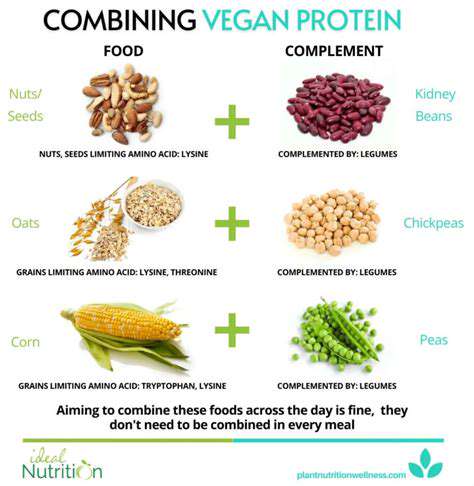The Gut Brain Connection: Food and Mental Health
The gut and the brain are intricately connected through a complex network of communication pathways, often referred to as the gut-brain axis. This bidirectional communication involves the nervous system, the immune system, and the endocrine system. This intricate network highlights the profound impact the gut microbiota can have on the brain's functioning. This connection is vital for understanding how imbalances in the gut microbiome can influence mood and mental well-being.
This communication goes beyond simple digestion. Nutrients absorbed from food, signals from gut bacteria, and even immune responses from the gut all play a role in shaping brain chemistry and influencing mood. Understanding these pathways is crucial to developing effective strategies for mental health.
The Impact of Gut Bacteria on Neurotransmitter Production
The gut microbiome plays a crucial role in the production of neurotransmitters, chemical messengers that transmit signals between nerve cells. For example, certain bacteria can directly influence the synthesis of serotonin, a neurotransmitter crucial for regulating mood, appetite, and sleep. Disruptions in this balance can lead to mood imbalances and contribute to conditions like depression.
Furthermore, the gut microbiota also influences the production of other neurotransmitters, such as dopamine and GABA, which are vital for motivation, reward processing, and stress response. Imbalances in these neurotransmitters can contribute to a range of mood disorders.
Inflammation and the Gut-Brain Connection
Chronic inflammation in the gut has been linked to mood disorders. An overactive immune response, often triggered by an imbalance in the gut microbiota, can lead to systemic inflammation, which can negatively affect brain function and contribute to mood disturbances. This inflammation can disrupt the delicate balance of neurotransmitters and further contribute to mood instability. Inflammation can have an effect on the blood-brain barrier as well.
The Role of Diet in Shaping Gut Microbiota
Diet is a key factor in shaping the composition and function of the gut microbiota. A diet rich in fiber, fruits, and vegetables supports a diverse and healthy gut microbiome, while a diet high in processed foods, sugar, and unhealthy fats can lead to imbalances. Maintaining a balanced and nutritious diet is essential for promoting a healthy gut microbiota and supporting overall mental well-being.
Prebiotics and Probiotics: Potential Therapeutic Tools
Prebiotics and probiotics are substances that can potentially modulate the gut microbiota. Prebiotics are non-digestible fibers that selectively stimulate the growth and activity of beneficial bacteria in the gut. Probiotics are live microorganisms, such as bacteria and yeasts, that provide health benefits when consumed in adequate amounts. These tools are gaining interest as potential therapeutic strategies for maintaining a healthy gut microbiome and potentially improving mood. Research is ongoing to explore their potential applications in treating mood disorders.
The Potential for Gut Microbiota Modulation in Therapy
The increasing understanding of the gut-brain axis is opening up new avenues for therapeutic interventions. Modulating the gut microbiota, for example, through dietary changes, prebiotics, probiotics, or even fecal microbiota transplantation, could potentially be used as a complementary or alternative approach to treating mood disorders. Further research is needed to fully explore the potential of these approaches and to establish their efficacy and safety in clinical settings. This is a rapidly evolving field.
Further Research and Future Directions
Further research is crucial to fully unravel the intricate connections between the gut microbiota and mood. Studies exploring the specific bacterial species associated with mood disorders, the mechanisms of interaction between the gut and the brain, and the development of targeted interventions are essential to advance our understanding. The potential for personalized approaches to gut microbiota modulation based on individual gut microbiome profiles holds significant promise for the future. This research is ongoing and could yield important insights.
Specific Dietary Components and their Mental Health Effects
Specific Dietary Components and their Mental Health Effects
The relationship between what we eat and how we feel is increasingly recognized. Numerous dietary components play a crucial role in modulating brain function and impacting mental well-being. These components, from essential nutrients to specific types of fiber, can either support or hinder mental health, highlighting the crucial link between the gut and brain.
Omega-3 Fatty Acids
Omega-3 fatty acids, particularly EPA and DHA, are vital for brain structure and function. Studies have shown a correlation between adequate omega-3 intake and improved mood and reduced symptoms of depression and anxiety. These polyunsaturated fats contribute to the production of neurotransmitters, impacting brain signaling and overall mental equilibrium. Incorporating fatty fish, flaxseeds, and chia seeds into your diet can provide these essential nutrients.
Probiotics and Prebiotics
Probiotics, live microorganisms, and prebiotics, non-digestible fibers, are increasingly recognized for their positive impact on the gut microbiome. A healthy gut microbiome is associated with improved mental health. Studies suggest that probiotics and prebiotics can help regulate neurotransmitters, reduce inflammation, and potentially alleviate symptoms of anxiety and depression. Fermented foods like yogurt, kefir, and kimchi are rich sources of probiotics.
Antioxidants
Fruits, vegetables, and certain herbs are rich in antioxidants, which protect the brain from oxidative stress. Oxidative stress is a key factor in various mental health conditions. Antioxidants help combat inflammation and free radicals, potentially mitigating the risk of neurodegenerative diseases and mood disorders. A diet rich in colorful fruits and vegetables provides a wide array of antioxidants, thus supporting overall brain health.
Polyphenols
Polyphenols, found in various plants, are potent antioxidants with potential mental health benefits. These compounds may influence neurotransmission, reduce inflammation, and improve cognitive function. Dark chocolate, berries, and green tea are excellent sources of polyphenols, and their consumption has been linked to a decreased risk of certain mental health issues.
Fiber
Dietary fiber, particularly soluble fiber, plays a crucial role in maintaining a healthy gut microbiome, which directly impacts mental health. Soluble fiber can help regulate blood sugar levels, reduce inflammation, and improve mood. Increasing fiber intake can involve incorporating more whole grains, legumes, and fruits into your diet. This is a key component in a comprehensive approach to mental wellness.
Sugar and Processed Foods
Excessive consumption of refined sugar and processed foods can negatively affect the gut microbiome and contribute to inflammation. These dietary choices can disrupt the delicate balance of neurotransmitters, potentially leading to mood swings, anxiety, and difficulty concentrating. Reducing the intake of these foods can significantly contribute to improved mental clarity and emotional stability. Prioritizing whole, unprocessed foods is a crucial step in fostering mental well-being.
Beyond Diet: Lifestyle Factors and Mental Well-being
Understanding the Gut-Brain Axis
The gut-brain axis is a bidirectional communication system connecting the central nervous system (CNS) and the enteric nervous system (ENS), located within the gastrointestinal tract. This intricate network allows for constant dialogue between the brain and the gut, influencing various bodily functions, including digestion, mood regulation, and even cognitive processes. Understanding this connection is crucial to comprehending how dietary choices and lifestyle factors impact mental well-being, extending far beyond simply considering caloric intake.
Think of it as a two-way street: The brain can send signals to the gut, impacting digestion and nutrient absorption. Conversely, the gut can send signals to the brain, influencing mood, stress response, and even cognitive function. This constant interplay highlights the profound influence of the gut on the brain.
The Role of Stress and Sleep
Chronic stress and sleep deprivation can disrupt the delicate balance of the gut-brain axis. Stress hormones, such as cortisol, can negatively impact gut motility and increase inflammation in the gut. This inflammation can, in turn, trigger or exacerbate mental health conditions such as anxiety and depression. Adequate sleep is essential for gut health, as it allows the gut to repair and regenerate, maintaining a healthy microbiome.
Prioritizing stress management techniques like mindfulness and exercise, alongside ensuring sufficient and quality sleep, can significantly enhance the gut's ability to support mental well-being. A disturbed gut-brain axis can contribute to feelings of anxiety and depression, while adequate sleep and stress management promote a more balanced and healthier response.
The Impact of Diet on Gut Microbiome
The composition of the gut microbiome, the trillions of bacteria and other microorganisms residing in the gut, plays a pivotal role in the gut-brain axis. A diverse and balanced gut microbiome is associated with better mental health outcomes. A diet rich in fiber, fruits, and vegetables supports a healthy microbiome, fostering beneficial bacteria and promoting a positive gut environment.
Conversely, a diet high in processed foods, sugar, and unhealthy fats can negatively impact the gut microbiome, leading to inflammation and potentially impacting mental well-being. Feeding your gut with nutrient-rich foods is essential in building a strong foundation for mental health.
Physical Activity and Mental Well-being
Regular physical activity has a significant impact on both physical and mental well-being, influencing the gut-brain axis in positive ways. Exercise reduces inflammation, improves blood flow, and promotes the growth of beneficial bacteria in the gut. These factors contribute to a healthier gut environment, which in turn supports better mood regulation and reduced stress levels. Physical activity can also act as a natural stress reliever, further improving the gut-brain axis communication.
Beyond Food: Environmental Factors and Mental Health
Environmental factors, such as exposure to toxins and pollutants, can also significantly impact the gut-brain axis and mental well-being. These factors can disrupt the delicate balance of the gut microbiome and increase inflammation, potentially contributing to the development of mental health conditions. Addressing environmental exposures and promoting a healthy lifestyle, including a nutritious diet, can help mitigate these negative impacts.
The environment we live in, from the air we breathe to the water we drink, directly affects the health of our gut microbiome and, consequently, our mental well-being. Creating a supportive and healthy environment is as important as maintaining a balanced diet and lifestyle.











